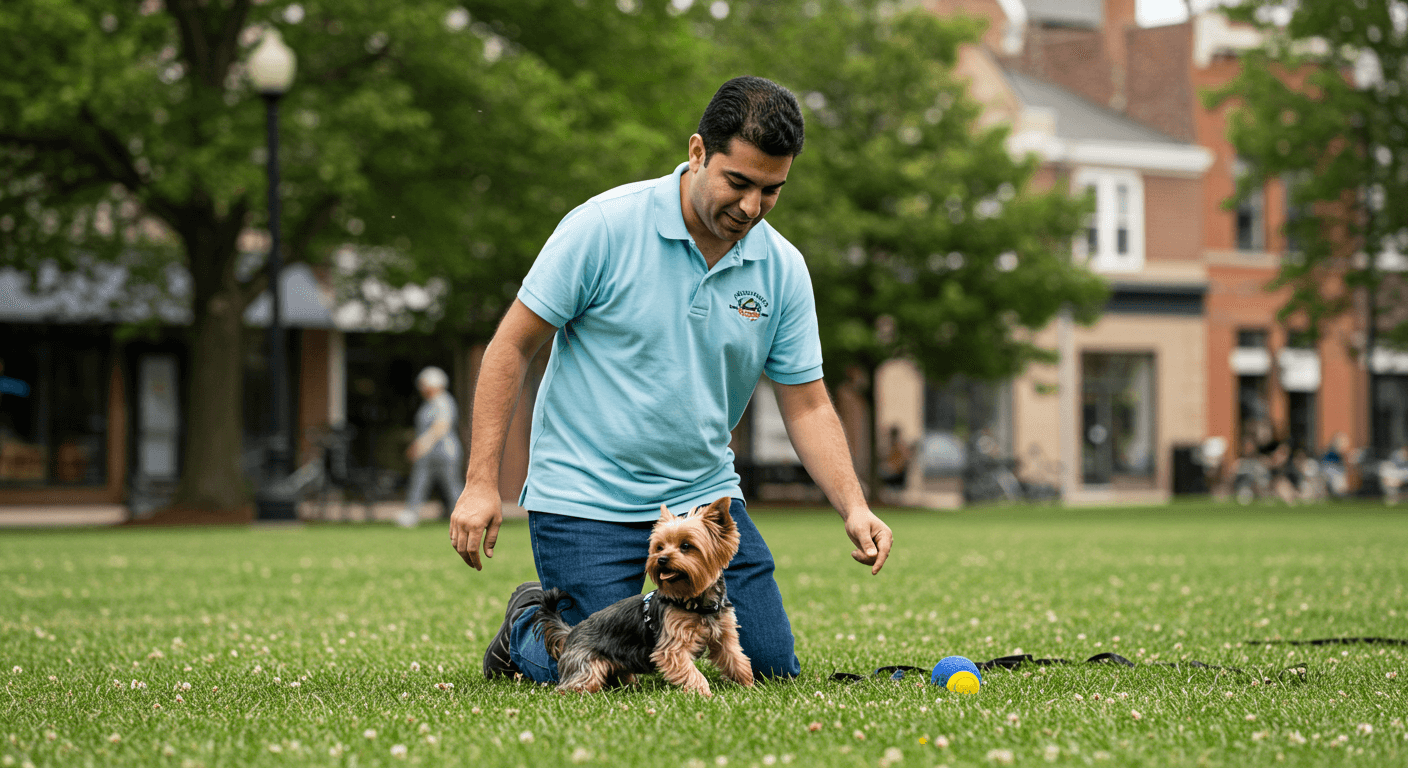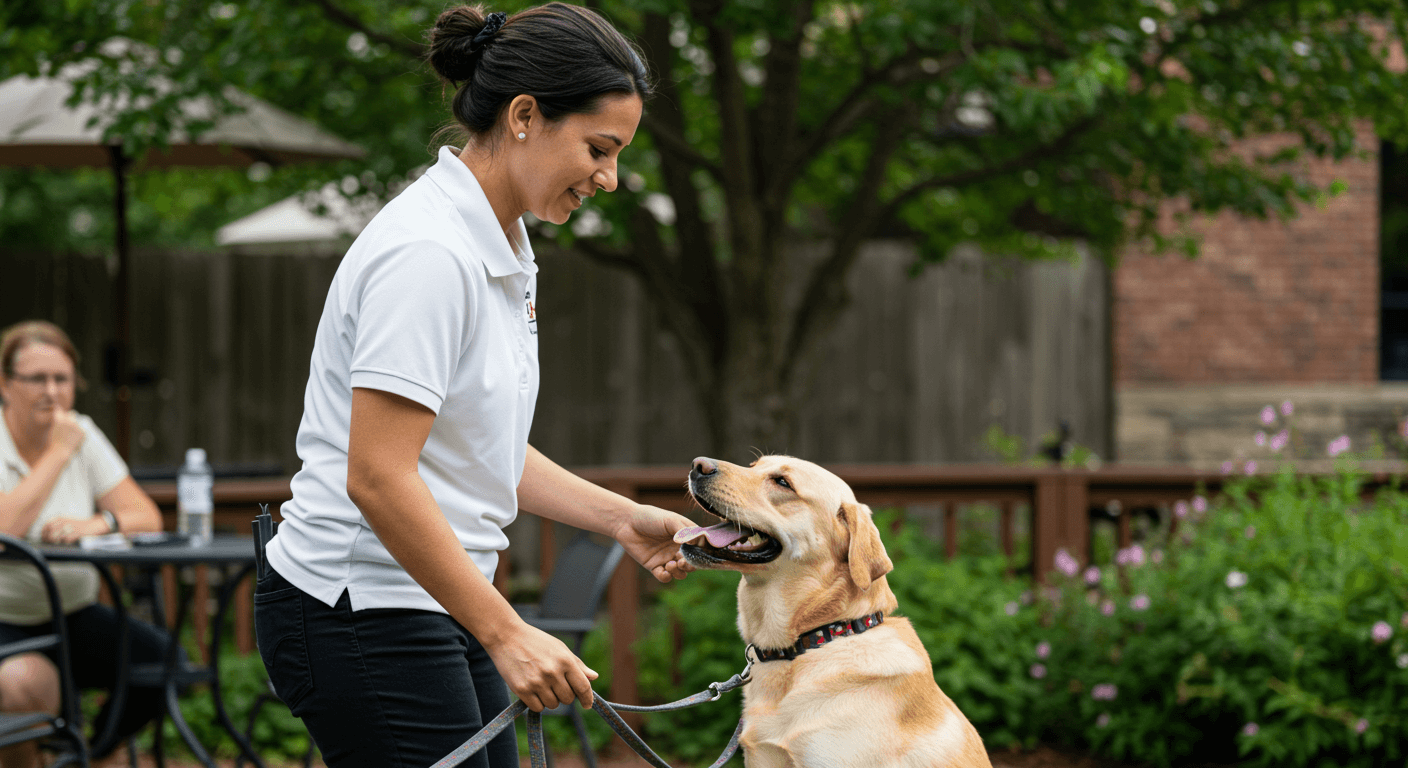Your Complete Guide to Choosing a Dog Trainer in Michigan
Finding the right professional dog trainer in Michigan means understanding how your dog will interact with this state’s unique environment. From urban neighborhoods in Detroit and Grand Rapids to lakefront communities along Lake Michigan, your dog needs skills that work everywhere you plan to take them.
Michigan’s diverse landscape includes crowded city parks, miles of Great Lakes beaches, and quiet rural trails. A well-trained dog can handle summer festivals, winter farmers markets, and busy trailheads without stress.
Most Michigan municipalities enforce their own local ordinances, but state-level laws cover rabies vaccination, dangerous dog regulations, and basic animal welfare standards. When you work with a trainer who understands these requirements, you’ll avoid common mistakes and build better habits from the start.
How to Choose the Right Trainer
Start by looking for someone who uses positive reinforcement training and understands Michigan’s four-season lifestyle. Your dog should learn to walk calmly on icy sidewalks in January, stay focused during summer street fairs, and practice good manners at dog-friendly breweries and restaurants.
Credentials help you quickly compare experience levels across different trainers. Common dog trainer certifications include CPDT-KA, KPA-CTP, or IAABC-CDBC for behavior problems. If your dog shows serious aggression or fear, look for someone with CBCC-KA or a structured program like CTC.
In-home dog training works best for door manners, jumping on guests, and basic obedience skills practiced in your actual living space. Group classes make sense once your dog can focus around distractions, especially before you tackle crowded beaches or busy downtown areas.
Ask about their approach to common Michigan challenges like greeting strangers in winter coats and boots, staying calm around wildlife on trails, or handling slippery surfaces during spring thaw. These details matter when you’re building real-world skills.
Common Dog Training Methods Explained

Reward-based methods create lasting behavior changes while keeping your dog confident and eager to learn. They also help you meet local requirements about keeping dogs under control in public spaces.
Basic obedience covers sit, down, stay, place, recall, and leash training so your dog can handle everything from farmers markets to outdoor concerts. These foundational skills prevent common problems before they start.
Puppy training focuses on socialization, potty training, bite inhibition, crate comfort, and early leash skills. Starting young with positive methods prevents the fear and reactivity issues that become harder to fix later.
Behavior modification addresses separation anxiety, reactivity, resource guarding, or fear through careful desensitization and counterconditioning. For serious cases, ask whether your trainer collaborates with veterinary behaviorists or veterinarians who understand behavior medications.
Private lessons and in-home sessions let you customize everything around your daily routines and specific problems. Day training can speed up results when you’re short on time, since the trainer works directly with your dog between coaching you on handling skills.
Dog training classes help your dog practice good manners around other dogs and people. The best classes screen participants carefully, give dogs plenty of space, and teach calm focus rather than just excitement.
Specialized training like service dog training or therapy dog training requires extra structure, public-access skills, and a very clear step-by-step training program. Not every trainer offers these services, so ask about their specific experience.
Board and train programs can work for busy schedules, but make sure the trainer uses humane methods and includes multiple handoff sessions so you learn to maintain the skills they’ve built. Without those transition sessions, progress often fades quickly.
Stay away from trainers who use fear, intimidation, or pain-based tools. Humane methods are safer, easier to maintain long-term, and far less likely to create new problems like fear or aggression.
Average Cost of Dog Training in Michigan (Updated for 2025)
Prices across Michigan vary based on the trainer’s credentials, session length, location, and whether they travel to your home. Here’s what most Michigan dog owners are paying in 2025.
| Service Type | Average Cost (Michigan) |
|---|---|
| Puppy classes (4-6 weeks) | $140-$260 total |
| Group obedience classes (4-6 weeks) | $150-$280 total |
| Private lessons (60-90 min) | $100-$180 per session |
| In-home training packages (4-6 visits) | $400-$850 total |
| Day training (per week) | $425-$900 |
| Behavior consult for reactivity/anxiety (initial) | $140-$230 |
| Board and train (2-4 weeks) | $1,900-$4,200 total |
Trainers in metro Detroit, Ann Arbor, and Grand Rapids typically charge at the higher end of these ranges. Rural areas and smaller towns often see lower rates, but you may pay travel fees if the trainer drives more than 15-20 miles.
Make sure you understand what’s included in each package, how progress is measured, and whether the trainer offers a free consultation or free evaluation before you commit.
Questions to Ask a Potential Dog Trainer
- What training methods do you use, and how do you keep training sessions positive and low-stress?
- What credentials do you have, like CPDT-KA or KPA-CTP? Do you keep up with continuing education such as CPDT-KSA?
- How will you customize the training program for my dog’s specific needs and our Michigan lifestyle?
- Do you offer in-home visits, group classes, or day training, and which approach fits my goals best?
- How will we measure my dog’s progress and know when to add more distractions?
- What are the total costs, including any travel fees, and what’s your cancellation policy?
- Do you carry liability insurance, and can you show me proof?
- For behavior problems, will you work with my veterinarian or a veterinary behaviorist if needed?
- What should I practice between our sessions to help my dog keep improving?
- Have you worked with dogs who struggle with Michigan-specific challenges like icy surfaces, crowded beaches, or wildlife encounters?
Local Michigan Rules and Considerations
Michigan enforces leash laws at the municipal level, so requirements vary by city and township. Most communities require leashes in all public spaces except designated off-leash dog parks.
State law requires current rabies vaccination for all dogs over 16 weeks old. You can get vaccinations through your veterinarian or county animal control clinics. Find more details on the Michigan Department of Health and Human Services website.
Michigan's dangerous dog law holds owners liable if their dog causes serious injury or death. Good training for dogs with aggression or reactivity isn’t just about convenience, it’s about legal protection and community safety.
Excessive barking can violate local noise ordinances in most Michigan cities. Work with your trainer on alert barking and separation anxiety before neighbors file complaints.
Michigan doesn’t require state licenses for dog trainers. Anyone can legally call themselves an expert dog trainer, which makes credentials and references even more important when you’re choosing someone.
If your trainer offers board and train services at a kennel facility, they may need to register with the Michigan Department of Agriculture and Rural Development under the state’s Animal Shelters and Pet Shops regulations.
Local Michigan Resources for Dog Owners
These locations give you great places to practice obedience training, work on recalls, and provide safe enrichment for your dog. Always follow posted rules and clean up after your pet.
- Belle Isle Park in Detroit offers miles of trails and open spaces where leashed dogs can practice focus around picnicking families, cyclists, and wildlife.
- Millennium Park in Grand Rapids includes trails, beaches, and open fields where dogs on leash can work on calm behavior around joggers and other dogs.
- Ludington State Park allows leashed dogs on trails and beaches, perfect for building focus around water, sand, and the sights and sounds of Lake Michigan.
Many Michigan cities also operate fenced dog parks where you can practice off-leash recalls in a controlled environment. Check your local parks and recreation department for the nearest options.

FAQs
How much does in-home dog training cost?
Most Michigan trainers charge $100-$180 per in-home visit, with discounts available when you buy packages of four to six sessions. Behavior problems and aggressive dog training typically start at the higher end of that range.
Is in-home dog training worth it?
Absolutely, because you’re working on problems exactly where they happen. Your trainer can fix door manners, jumping on guests, counter-surfing, and reactivity right at home, then step outside to practice leash skills on your actual neighborhood sidewalks.
Can you pay someone to house train your dog?
Yes, many trainers offer puppy classes or private lessons that include potty training, crate routines, and daily schedules. Day training can speed up the process while teaching you how to maintain the progress.
What is the 3-3-3 rule for dog training?
This is a helpful timeline for new or adopted dogs: expect about 3 days for your dog to decompress, 3 weeks to learn your routines, and 3 months to feel completely settled. Good dog training services work with this natural adjustment period.
How long will it take to reach my training goals?
Most puppies and friendly adult dogs show solid progress within 4-8 weeks if you practice daily. Fear, reactivity, or aggression typically requires several months of careful behavior modification with gradual increases in difficulty.
What should I bring to group classes?
Pack a flat collar or harness, a 6-foot leash, high-value treats, water, and current vaccination records if your trainer requests them. Leave retractable leashes at home for safety reasons.
What’s the leash law in Michigan?
Leash laws vary by city and township. Most Michigan communities require dogs to be leashed and under control in all public areas except inside designated off-leash dog parks. Check your local ordinances for specific requirements.
Do I need a dog license in Michigan?
Many Michigan cities and counties require annual dog licenses. Contact your local city clerk or county animal control office to find out the requirements and fees for your area.
What shots does my dog need in Michigan?
Rabies vaccination is required by Michigan state law for all dogs over 16 weeks old. Your veterinarian may also recommend distemper-parvo and bordetella based on your dog’s lifestyle and exposure to other dogs.
Are dog trainers required to be licensed in Michigan?
No special trainer licenses exist in Michigan. Trainers follow normal business regulations, but if they offer board and train services, their facility may need to register with the Michigan Department of Agriculture and Rural Development.
Where can I practice off-leash recall?
Use fenced dog parks to keep things safe and legal. Many Michigan cities operate multiple dog parks where you can practice recalls and socialization during quieter hours.
Which dog parks allow training around Michigan?
Most Michigan dog parks welcome training as long as you follow posted rules and your dog isn’t disrupting other visitors. Contact your local parks department for a list of fenced off-leash areas in your community.
What beaches or trails allow dogs for training?
Many Michigan state parks allow leashed dogs on trails and beaches, including Ludington State Park, Sleeping Bear Dunes National Lakeshore (on specific trails), and Pictured Rocks National Lakeshore (on designated trails). Always check current rules before you visit, since regulations can change seasonally.
How do I find a certified dog trainer near me?
Look for trainers with credentials like CPDT-KA, KPA-CTP, or IAABC-CDBC. Check their websites for client reviews, ask about their methods during a free consultation, and make sure they carry liability insurance.
What’s the best age to start puppy training?
Start socialization and basic training as soon as you bring your puppy home, usually around 8 weeks old. Early puppy classes help prevent fear and behavior problems while building a strong foundation for obedience training.
Can a professional dog trainer help with separation anxiety?
Yes, separation anxiety requires careful behavior modification using desensitization and counterconditioning. Look for a trainer with experience in this specific issue, and be prepared for a longer timeline than basic obedience work.
What’s the difference between obedience training and behavior modification?
Dog obedience training teaches your dog skills like sit, stay, and recall. Behavior modification addresses emotional problems like fear, reactivity, or aggression by changing how your dog feels about specific triggers. Many dogs need both.
How do I know if my dog needs private lessons or group classes?
Start with private lessons if your dog shows fear, reactivity, or aggression, or if you’re working on specific household problems. Switch to group classes once your dog can focus around other dogs and people, or if you just need help with basic manners.
The right combination of thoughtful planning, humane methods, and consistent practice will help your dog become a well-behaved dog who handles Michigan’s diverse environments with confidence. Whether you’re walking city streets, exploring state park trails, or visiting dog-friendly patios, a solid training program makes every outing safer and more enjoyable for everyone.
